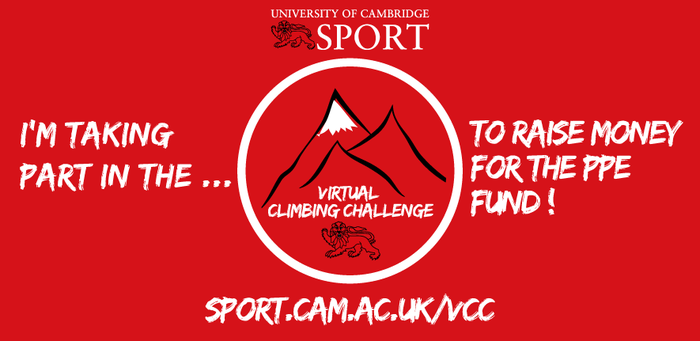Interview With Organisers Of First Ever Virtual Inclusive Boat Race
In advance of the inaugural Virtual Inclusive Boat Race, Varsity spoke to organisers Luke Cavanaugh, LCAP Consulting co-founder, and John Willis, Power2Inspire founder, about wider issues of inclusivity in sport in Cambridge and beyond.
- What is ‘The Virtual Inclusive Boat Race’?
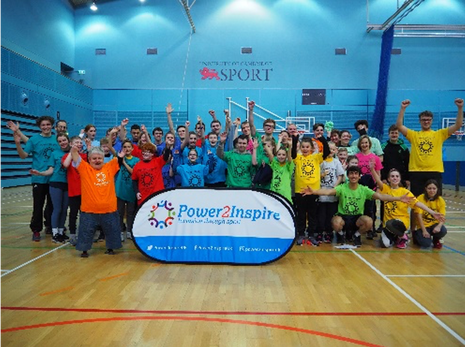
From the Official Press Release:
“For the first time ever, on Saturday 13th June 2020, Olympic, Paralympic and club rowers, representing teams from Oxford and Cambridge, will compete side by side in the MCH.London virtual boat race to raise funds for Power2Inspire, the charity that is focussed on inclusion through sport.
Rowers including World Champion Oliver Cook, Rio Paralympic Champion Grace Clough, Olympic Triple Gold Medallist Pete Reed, Australian para-rower Renae Domaschenz, and Gold Medallist Tom Ransley, will all race from their homes across the world.
Garry Herbert and Martin Cross – of the BBC – will be providing commentary of the event, in what promises to be a high action, shared sporting occasion online.
The two teams, Oxford and Cambridge, will be made up of eight rowers each, with able-bodied, disabled, lightweight and openweight participants. The rowers will be racing on ergometers in their homes across the world, with Jan Ole Ernst in Germany, Renae Domaschenz in Australia, Sophie Paine in the Bahamas, and the remaining team members in the UK.”
- How will people be able to watch and get involved?
The fundraising page will be going live on Tuesday at https://donate.giveasyoulive.com/, where the video will also be streamed at 3pm on the 13th June. BBC Sport have also expressed interest in showing the Race on their website as well, and John will be giving interviews to BBC 5 Live as well as local radios in the build-up to the events.
However, we need more sports and activities that emphasise people’s ability rather than their disability
- How has the pandemic affected your plans?
Luke Cavanaugh: When we first had a discussion about working with John in January as part of our pro-bono work for our company LCAP Consulting, Alex Parton and I spoke with him about having an event that was broadly the same in scope and mission.
However the key issue was that the event was supposed to have been completed and streamed live, at one of the boat houses, as a relay. This has had to change, as have team meetings etc., which have now largely taken place on Zoom. So unfortunately this has made it more difficult to build a team spirit and ethos, but our rowers are currently taken away by the excitement of it all nonetheless.
A massive plus has been that the Virtual version of the event has allowed us to pull in rowers from all over the world. Jan Ole Ernst on the Oxford side is based in Germany, while on the Cambridge side Renae is competing from Australia and Sophie from the Bahamas.
- What gave you the idea for the event?
John Willis: I set up Power2Inspire to champion Inclusion through Sport. I was a cox at Cambridge and beyond and when I saw the success of our Inclusive Festivals (badminton, hockey, tennis and golf) I was determined to find a way to make a rowing event that was truly inclusive. Seeing Olympic champions competing alongside talented club oarswomen inspires me. I want everyone to experience the good in sport, the fun, the camaraderie, to really enjoy the taking part.
- How is the fundraising going?
John Willis: We have set a £25k target to fund the development of the University PowerHouse Games - these games bring together university sports clubs with students from a state, an independent and a special needs school to unite individuals of all abilities through sport.
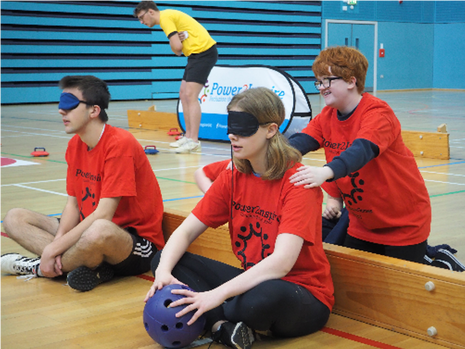
Luke Cavanaugh: The University PowerHouse Games are a fantastic concept, and LCAP worked with John in February to host a Caius PowerHouse Games - an inclusive sports day that saw able-bodied and disabled children, along with some forty Caius volunteers, compete in an array of inclusive sports.
- Are you looking to expand the event in the future, and if so how?
John Willis: Certainly, we would love to make this an annual event and be able to include the whole of the Oxford and Cambridge communities further.
Some wider questions about inclusivity in sport:
- Has inclusivity in sport improved in recent years? Is there a long way still to go?
John Willis: I thought the Beijing Olympics were a huge milestone for disabled sport, in terms of raising the profile of disabled Chinese athletes, and athletes more broadly. Since then inclusive sport has come on leaps and bounds, but the fact that this boat race is the first of its kind indicates that we’ve got an awfully long way to go
Luke Cavanaugh: Certainly we hope that this boat race will inspire others to do their part in promoting inclusive sport. There’s a lot more work to be done: this race enables men and women, disabled and non-disabled athletes to compete all together, but it has equally opened our eyes to the lack of representation of BAME rowers at an elite level.
Of course, the example of the lack of LGBT+ representation in the Premier League, and others, shows that while we are moving in the right direction, it is important that inclusivity becomes more and more of a focus in sport at both an elite and grassroots level.
- Are there particular inclusivity issues you see in university sport? Have these changed over the years? Are there ways to tackle these?
John Willis: A brilliant recent development has been the One Club Policy that brings together the men and women in every sport under one club in Cambridge. So too has the development been welcomed that the Boat Club will now be operating as one club for both men and women.
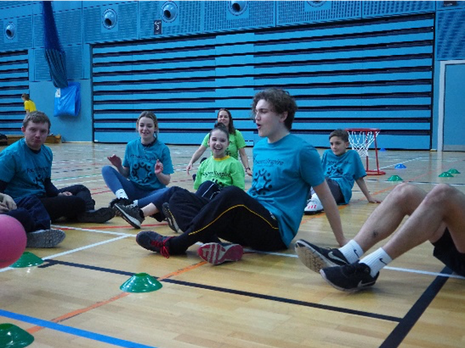
However, we need more sports and activities that emphasise people’s ability rather than their disability: more games like Korfball, where disabled people can be accommodated competitively.
Events like the PowerHouse Games can tackle these, our flagship events that are designed as inclusive sports days using adapted games and sports where everyone can take part: sitting volleyball, new age kurling, visually impaired football, and boccia.
- How inclusive do you think sport is at Cambridge?
Luke Cavanaugh: Steps are definitely being made in the right direction on this front, and as John outlines above, the ‘One Club’ policy and the announcement that the Boat Club will now be run as a joint men and women’s team is welcome.
However, there is still so much to be done. While many colleges are doing well to offer mixed gender sports teams, or at least women’s/non-binary teams to complement men’s teams, the profile of these teams is often a lot smaller and there is a quite a large gap in funding between the two.
Elsewhere, so much of grassroots sport follows the lead of the professionals, and issues such as a lack of LGBT+ representation in the Premier League makes a striving for inclusivity a lot more difficult within Cambridge sport, despite the best efforts of team captains, club presidents, and student unions.
- How important is it to make sure sport is seen as inclusive from early on in life (especially at school and later at university)?
John Willis: I think this is fundamentally important, as it doesn’t allow those social barriers to form that become a hindrance later in life, meaning that we would never have to push back against the creation of those barriers at a later age (university etc.).
We long to see a society where everyone can enjoy inclusive sport together...
- How important do you think sport and exercise are for helping people, physically and mentally, through lockdown?
John Willis: Sport is absolutely vital for alleviating loneliness and connecting those who are otherwise alone. Our seat-based exercise classes that we have been running on Facebook throughout lockdown recently saw 8,000 concurrent views of the livestream!
Luke Cavanaugh: I would echo what John said. Sport is so important for its community aspect, and it is no surprise that apps such as Strava are doing so well at the moment, as they allow people to come together through sport. The aim of the boat race is to get people to do this virtually, even if not in person yet.
Some questions about Power2Inspire:
- What inspired the creation of ‘Power2Inspire’?
John Willis: Our mission is straightforward. We long to see a society where everyone can enjoy inclusive sport together, playing sport together regardless of age, gender, faith, ethnicity or disability. Our task is to embed inclusive sport in communities by delivering events for everyone to enjoy.
An extract from the history section of the Power2Inspire website:
“Power2Inspire was established following a triathlon relay in September 2013. Founder John Willis, born without fully formed arms and legs, joined forces with able-bodied friends, Tim Martin and Henry Brown, to compete in an able-bodied triathlon relay.
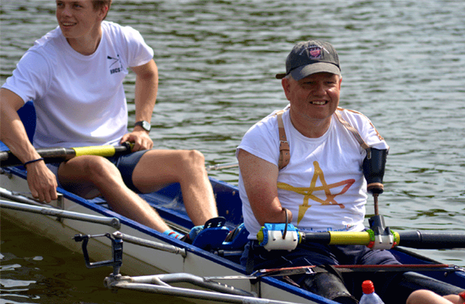
John undertook the swim, Tim the cycle ride and Henry the run. Together they smashed their goal of not coming last – they finished 18th out of 27 teams – but more importantly realised it was great fun to participate in a mixed ability team.
Inspired by an advert showing non-disabled players joining a wheelchair user in a game of basketball, John established the core of the Power2Inspire’s mission – Inclusion through Sport. Determined that his experience as a child of being excluded from sports should not be repeated, he created Power House Games.”
- Can you tell us a bit more about previous events you have put on?
Luke Cavanaugh: A great example would be the Caius PowerHouse Games, which LCAP put on in partnership with Power2Inspire and with the help of Caius students. The PowerHouse Games is an inclusive sports day, integrating a crowd of state, independent and special-needs school students alongside university volunteers, whose function is to expose pupils from a range of backgrounds to the opportunities that the university has to offer, showcasing its facilities in the process.
Not only were these games a delightful success, but was great fun for all the students (university or otherwise) that took part. Volunteering is a big part of student life, and to work with such a worthy cause is inspiring for us, and we hope to continue to develop our work with John Willis and his team.
The full team line-ups:
Oxford: Amelia Standing, Pete Reed, Grace Clough, Oliver Cook, Jan Ole Ernst, Martha Birtles, Alex Bebb and Amy Hosking
Cambridge: Jan Helmich, Freddie Markanday, Sophie Paine, Pippa Whittaker, Renae Domaschenz, Tom Ransley, Miranda Clements and Ollie Parish
Full information can be found here.
 News / Hundreds of Cambridge academics demand vote on fate of vet course20 February 2026
News / Hundreds of Cambridge academics demand vote on fate of vet course20 February 2026 News / University Council rescinds University Centre membership20 February 2026
News / University Council rescinds University Centre membership20 February 2026 News / Judge Business School advisor resigns over Epstein and Andrew links18 February 2026
News / Judge Business School advisor resigns over Epstein and Andrew links18 February 2026 News / Petition demands University reverse decision on vegan menu20 February 2026
News / Petition demands University reverse decision on vegan menu20 February 2026 News / Caius students fail to pass Pride flag proposal20 February 2026
News / Caius students fail to pass Pride flag proposal20 February 2026

